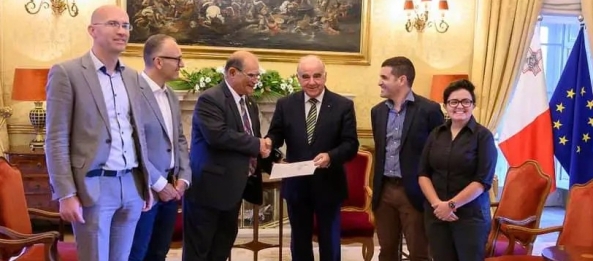(photo: presenting to President George Vella proposals for the consideration of the Constitutional Convention : 5 November 2019)
The role of the President in the governance of this Republic, on paper, is just an issue of formality. In practice, however, it can be much more than that.
Undoubtedly Myriam Spiteri Debono will be a different President from her predecessors. Spiteri Debono has a distinct advantage over all of her predecessors: she has no political baggage because she has not held any executive political office to date. Only Sir Anthony Mamo, the first President, had the same advantage!
In her inaugural speech as President, Myriam Spiteri Debono made many an important political point. Fundamentally she emphasized that she will not seek to influence the political debate (a difficult pledge which, however, she did not strictly follow herself). Although she did not name him, this was a clear dig at her predecessor, who, in addition to lobbying the executive intensively in favour of his contrasting political views, unashamedly interfered in the public debate on proposals relative to the IVF legislative changes as well as on Bill 28 which sought to clarify the abortion provisions of the Criminal Code.
His Excellency George Vella would have been taken to task in any self-respecting Parliament. A motion for his removal, because of his behavior, would have been submitted for Parliament’s consideration. Almost two years ago, given the President’s behaviour in office, I had written in these columns that there are “valid reasons to consider the impeachment of Dr. George Vella from his Presidential duties.” (TMIS: The Presidential rubberstamp: 31 July 2022)
Any person who allows his personal views to conflict with his or her Constitutional duties is, in my view, not fit for office.
Parliament, unfortunately, was not irked by George Vella’s arm-twisting of the executive. It was not bothered, as it thanked Vella for his services! Not one of the Members of Parliament stood up to remind one and all that when the holder of the office of the President interferes in the political debate, he/she is performing a grave disservice to the Republic.
One only hopes that there is no repetition of this interference in parliament’s work.
Parliament needs to reinforce the office of the President. In particular, for example, the Constitution needs some clarity as to how the President can defend the Constitution when he/she does not have the appropriate legal tools available.
Let me clarify: It is essential to consider in some depth the role of the President of the Republic. Specifically, we should consider whether the President should continue to be just a rubberstamp or whether he or she should have limited review powers over Parliament’s legislative function.
ADPD- The Green Party, in submissions to the still pending Constitutional Convention, focused on this specific matter, among other issues. In the document submitted to the Convention, my party proposed that the President should be able to send legislation back to Parliament for its reconsideration, if, in his/her view such legislation runs counter to the provisions of the Constitution.
The President, on assuming office, declares that he/she will do all it takes to defend the Constitution. He/she is not however equipped with any (constitutional) tools with which to carry out this responsibility.
The Green proposal presented more than four years ago for the consideration of the Constitutional Convention identifies an essential tool with which His Excellency the President can act responsibly within the parameters of the law. We further proposed that should Parliament refuse to budge, the President should refer the matter to the Constitutional Court for a final decision.
This is how the Presidency should function. Much better than when it was subject to the George Vella theatrics, lobbying, and arm-twisting of the executive.
published in Malta Independent on Sunday : 14 April 2024








